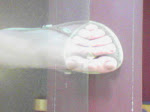I've been reading Tom Rachman's The Imperfectionists and am very, very into it. It's sort of like those employee bios on a company web site, and it's sort of like a compendium of short stories, and it's sort of like a fictional history of a newspaper, but all of them together but not.
In any event, I have one point of contention. In the book there's an anal editor, as all good editors should be, who includes in his newspaper's Bible an entry condoning any reporters who might use the word "literally" when speaking hyperbolically. Fair enough. In journalism, it's egregious. But I've seen this issue come up in the every day, which is a whole other matter. Indeed, to say "he literally jumped out of his skin" when no such grotesque occurrence happened is definitely technically wrong. And I am nothing if not a technical anal grammar nutcase.
But!
There's a concept in linguistic anthropology in which meaning and usage are not subject to history or a dictionary but to common usage. The meaning of words alters as the culture sees fit. At this juncture, people use the word "literally" most commonly when they are not being literal. I think most people are aware of this and do so because the power of exaggerating and using the word literal in fact amplifies the exaggeration. "He jumped out of his skin" we obviously realize isn't literal, just a metaphor for someone reacting in a frightened manner. But to say "he literally jumped out of his skin" makes it seem like an even stronger reaction, as if the impossible metaphor nearly came into being. Whether this is the intention or not, or if it's just an automatic quirk of language, this is one of those commonalities to which I don't take offense. Dangling prepositions will bug me till the day I die, but I literally could not care less how the masses employ the adverb.
Friday, April 8, 2011
Subscribe to:
Post Comments (Atom)
In summing up, I wish I had some kind of affirmative message to leave you with. I don't. Would you take two negative messages?
-- Woody Allen

1 comment:
Yeah, I too have bigger language pet peeves. By the way, this made me think of the "Literally" MadTV skits. It's one ridiculous punch line after another.
Post a Comment